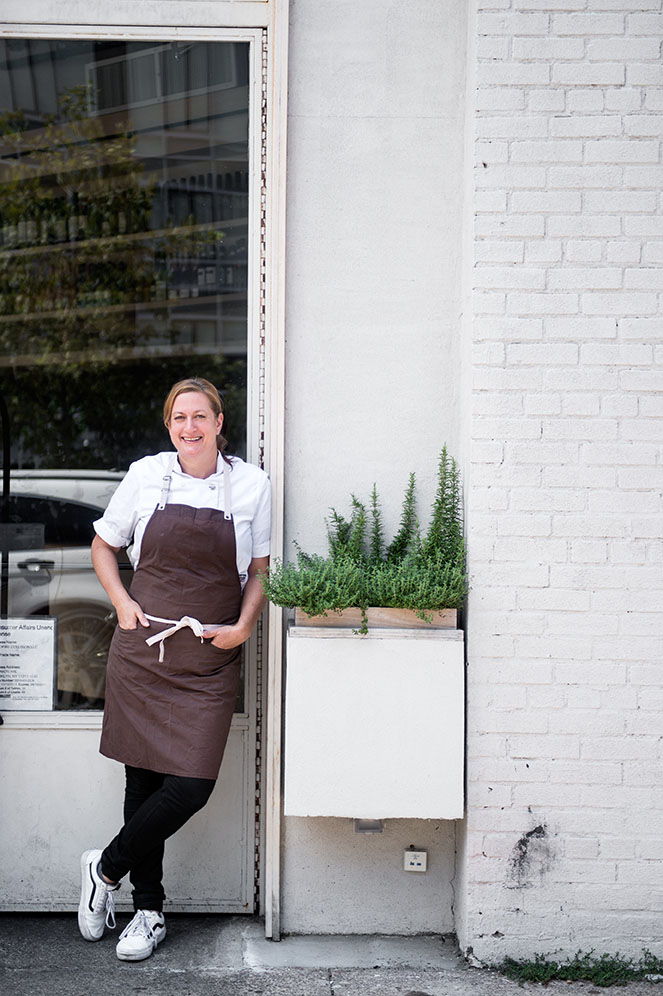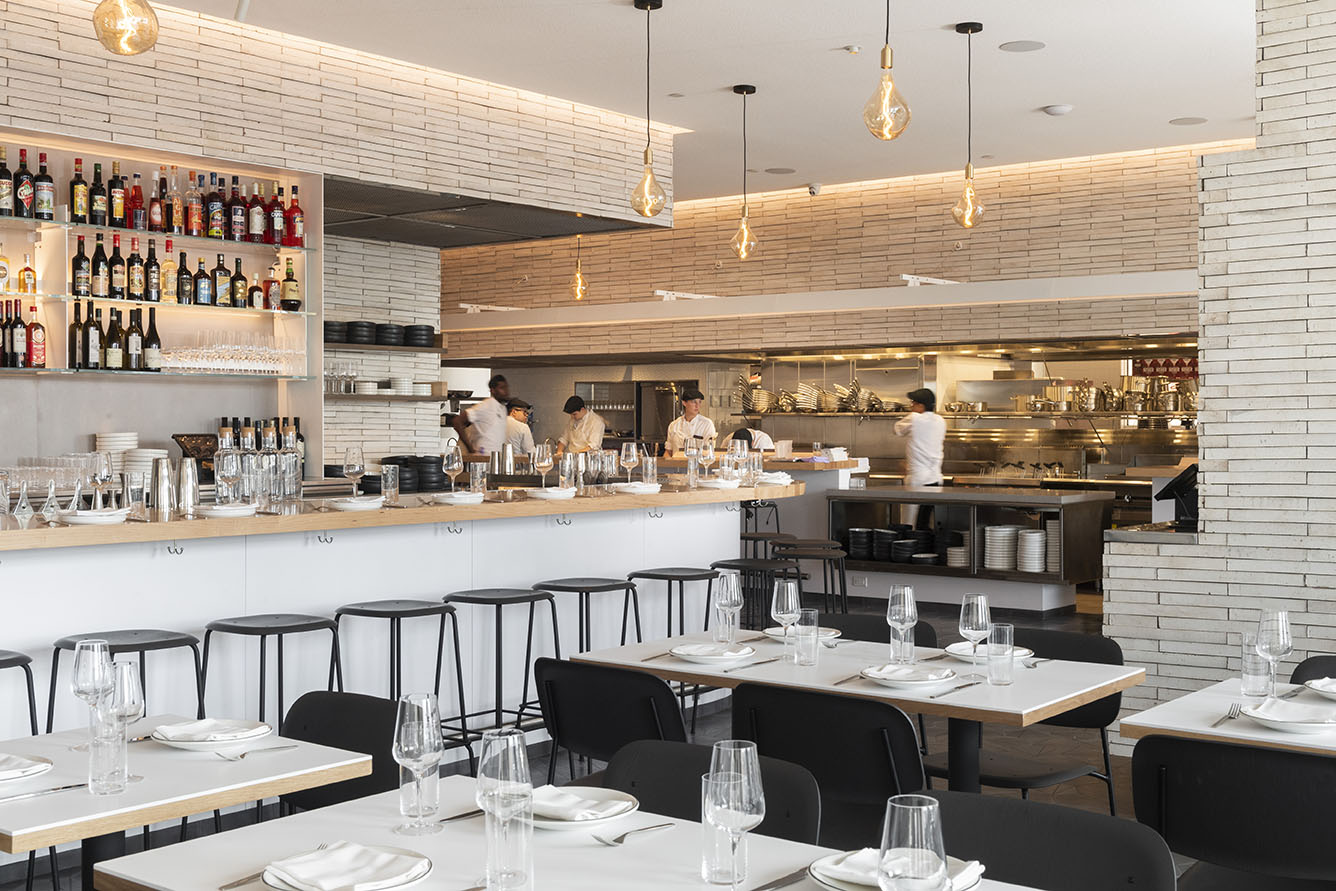The 2018 James Beard Award winner for Best Chef: New York City, Missy Robbins (Culinary, '95) opened her second restaurant, Misi, in September. Her original Williamsburg restaurant, Lilia, and Misi both earned three-star reviews from The New York Times and are booked enough for Missy to call herself “a full-time reservationist at this point,” referencing constant text message requests for the coveted tables.
Missy spoke to students about her career and day-to-day work during the November iteration of ICE’s Meet the Culinary Entrepreneurs series. The chef worked in restaurants for nearly 10 years before taking a break to travel and focus on her health, then returned to consulting when her neighbor, Sean Feeney, expressed interest in opening a restaurant together.
“He made incredible bolognese, which I thought was rather assertive of him,” Missy told students, recalling Sean’s initial pitch over dinner at his apartment.
Here, we highlight six of Missy’s best tips for aspiring chefs and restaurant owners, quoted from her experiences.
On opening her first restaurant in Williamsburg:
The goal for this was how do we get the neighborhood to be excited about this restaurant? There are all these huge condos, how do we get them in three times a week? I wanted the food to be craveable, and I wanted it to be things that I wanted to eat. Lilia as a whole was really created as the restaurant that I would want to go to on my night off. There are very few of those that I feel really excited about. I wanted to be able to create that for other people and have them feel like they were coming into our home, have amazing hospitality, amazing food, great music and this great beautiful vibe with giant windows and 16-foot ceilings. It’s been really exciting to be able to do that.

On her approach as the chef:
Why do I try to cook for a critic, for a Michelin star or to prove something? How about just cooking food and seeing how people react to it? For me, there was some risk involved in that. The culinary voice grew out of that desire to cook great food for people and put all those outside voices to rest and not worry. In doing that, I’ve become a better cook, a better leader and a better teacher because I’m not trying to prove anything. I’m just cooking what I want to cook, and I hoped to God that people were going to like it.
On her business partnership:
Sean plays a huge role. He is a full-time partner. He runs operations, finance, all the fundraising, all investor relations (sending out monthly reports to them). He takes care of that and P&Ls for internal use, and then he’s on the floor all night. He’s like a GM. He’s there greeting people, talking to people, making them feel like they’re in his home, and I’ve never seen anything like that. I’ve been doing this for a really long time, and he is incredible.
He had never worked in restaurants. He had done some consulting, but never worked on the floor, and the most special part about him is that he was never afraid to ask questions. That takes a certain kind of personality, and I’ve always admired that quality in him.
One of the things that makes him successful as a business person is that he has gone out and learned every single thing about this industry in such a short amount of time. He has taken the time to meet with as many people as he can from as many facets of the industry as he can, whether it’s a GM at a restaurant, an operator or someone in tech. We balance each other really well because we have different interests but the same goal.
On real estate — converting an auto body shop vs. opening in a new building:
With Lilia, there’s a built-in charm; we didn’t have to do much. We had to clean it up but we didn’t have to do a lot from a design perspective. There were advantages to it. Then with [Misi in] a new building, the challenge was that we had this nondescript space and I said, “How do I make this charming?” Especially when I’ve been spoiled with Lilia and I knew that everyone was going to compare it to Lilia. [With a second restaurant,] you have to figure out how to make it different enough but still feel like it’s in your family, and it was really important to me that it felt like a Missy Robbins restaurant.

On managing a staff:
Staffing’s a great challenge. Keeping your staff happy and engaged and your guests happy and engaged are the two things that we focus on the most. We work very, very hard to create an environment where our staff wants to be so that they’re excited about being there, and the same with our guests, we take both really seriously.
At the very beginning of Lilia, I was doing production, and I would go in and make the mozzarella. One day, I was thinking this is not going to work. Some day, I’m not going to be able to make the mozzarella and who the hell’s going to do it if they don’t know how to do it? I would go there in the morning, hang out with the chefs, and I would change into my whites but I would be around doing something else. Then gradually, I wouldn’t change into my whites. It was never spoken that I wasn’t prepping anymore, but it was fairly understood by the team. That was not going to be my role in this restaurant, but I was available to them to troubleshoot, and I was always going to be there tasting food. I still do all of the menus at both restaurants.
On owning two restaurants now:
I’ve definitely gone from Spiaggia, where I cooked every morning doing a lot of production; to A Voce, where I cooked a little less; to Lilia, where I expedited every night for basically the first year and a half. It’s part of our success, me being there. People would come in and say, “Oh, I’m so surprised you’re here,” and I’d think, where am I supposed to be? I have one restaurant, this is my job. And I don’t think that’s a common approach these days. I love being at Lilia. I have not been working service there because I’ve been at the new restaurant, and I miss it. The way it’s built, where I can be in the kitchen but be in the dining room at the same time, is amazing.
I have a chef de cuisine at Lilia who has just started to work with me on dishes, which is great, but for the first two and a half years, I did the menus. I wanted it to be that way. I had to make the restaurant successful, and to me, the only way to do that was for every dish to have my voice. When you start integrating other people’s voices, you lose that. For me, for the first couple of years at Lilia, it was really important for that voice to be very, very clear.
Find your culinary voice at ICE, and learn more about owning and operating eateries in our Restaurant & Culinary Management program. Plus, see upcoming speakers in our Meet the Culinary Entrepreneurs series.




